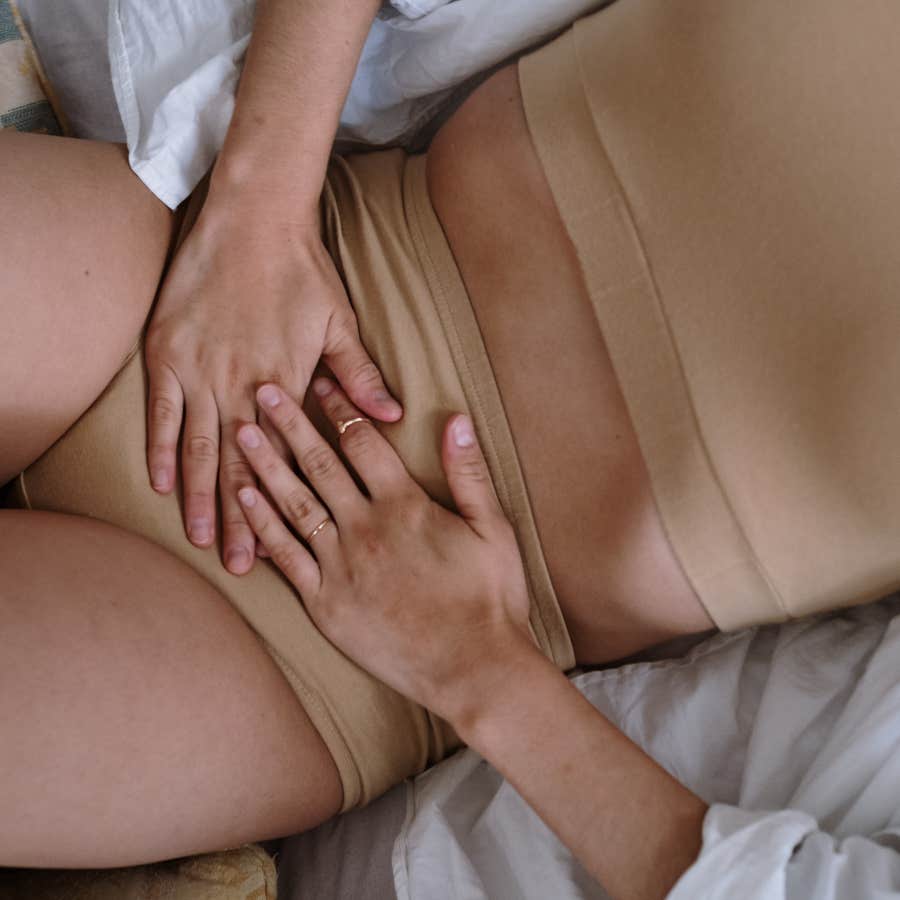There's A Scientific Reason Women Wake Up Feeling So 'Ugly' Some Days
Your hormones are the real culprit here.
 cottonbro studios / Pexels
cottonbro studios / Pexels Have you ever woken up, looked in the mirror, and thought, “Why is there an ancient, decrepit witch staring at me? Is that me?”
You might overanalyze the way your chin seems to have become many chins or how sallow your skin looks. Feeling ugly is always rough on anyone’s self-esteem, but the good news is that if you’re someone who menstruates, you’re not alone in feeling this way.
There’s a scientific reason why women wake up feeling 'ugly' some days.
And it all comes down to where you are in your menstrual cycle.
A woman named Sam Doll made a TikTok in which she revealed that having an ugly day, or a week or two of ugly days, is entirely normal, biologically-speaking. She spoke to the universality of the ugliness experience, opening her post by posing the question, “So, you’re telling me that all women have the thing where you wake up ugly out of nowhere?”
“Truly, [I] thought that only happened to me,” she said. “You don’t understand the relief I felt, initially, when I found out that it was everybody.”
Doll described looking in the mirror and seeing “an 85-year-old woman that grew up in the trenches,” only to realize, “Oh, no, it’s that phenomenon that’s happening, where I’m suddenly the ugliest person I’ve ever heard of.”
The phenomenon she’s describing is called the luteal phase, which occurs during the two-week time frame between ovulation and starting our periods. As Doll described it, “Our hormones are plummeting, and all of a sudden, we’re irritable, and we’re bloated, and our faces are different shapes, and we’re mean, feel fat and also so, so hungry.”
The luteal phase is the last part of the menstrual cycle, and the spike in hormones can lead to major shifts in mood and physicality.
The menstrual cycle is made up of 4 phases: the menstrual phase, the follicular phase, the ovulation phase, and the luteal phase. Cleveland Clinic notes that the average timing for a menstrual cycle is 28 days, therefore the average luteal phase lasts between 12 to 14 days.
Yet there are variations to what’s considered “average,” and a luteal phase can last anywhere from 10 to 17 days and still be considered within the range of normal.
 Photo: Karolina Grabowska / Pexels
Photo: Karolina Grabowska / Pexels
During the luteal phase, hormone levels change to prepare the uterine lining for the possibility of accepting an embryo, in case of fertilization. In this phase, the levels of estrogen and progesterone increase, which makes the uterine lining thicker.
According to Verywell Health, it’s the spiking of hormones that can lead women to feel lower than usual. Symptoms of the luteal phase mirror PMS symptoms, which can include fatigue, low energy, shifts in mood, bloating, and appetite changes.
Progesterone, specifically, makes people in the luteal phase feel tired or lethargic, as elevated levels of the hormone cause fatigue. The luteal phase occurs to prepare the body for pregnancy; if an egg is not implanted, the levels of estrogen and progesterone decline, and the lining of the uterus, called the endometrial lining, starts to shed, marking the start of a period.
Doll’s post received over 1 million likes and over 11,000 comments, mostly from people commiserating about the severity of changes they feel during the luteal phase.
One woman described how the luteal phase affects her, claiming, “I want to quit my job and cut my hair when I’m in my luteal phase.”
“Wait until menopause!” Another woman exclaimed. “You’ll be pretty every day but so much angrier.”
“I swear, we get like 6 good days a month,” said someone else.
One woman noted that having both Polycystic Ovary Syndrome (PCOS) and Premenstrual Dysphoric Disorder (PMDD) makes her luteal phase feel especially intense. Her comment was followed by over 100 comments from other women with PCOS and PMDD, describing how they’re affected by the combination of syndromes and symptoms.
 Photo: cottonbro studio / Pexels
Photo: cottonbro studio / Pexels
The original creator responded to that particular comment, wondering if her own PCOS made her luteal phase feel worse. Other women explained that having PCOS can be connected to also having PMDD, and that having a hormone imbalance means that hormone-imbalanced changes are more dramatic in how they present themselves.
There was a general sense of solidarity in the comments section, as women affirmed other womens' experience, offering emotional support and practical suggestions for tracking and managing shifts in mood.
The universality of the luteal phase experience and the scientific evidence for its occurrence translate to one resounding message: At the end of the day, you’re not crazy or ugly. Your body’s just going through it, and like all phases and feelings, this one isn’t permanent.
So, on days when you feel like throwing yourself in the trash and calling it, remember: This, too, shall pass.
Alexandra Blogier is a writer on YourTango's news and entertainment team. She covers women's health and wellness, pop culture analysis and all things to do with the entertainment industry.
